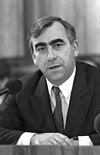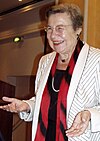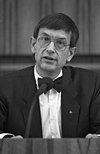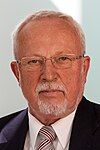Cabinet Kohl III
| Cabinet Kohl III | |
|---|---|
| 16. Cabinet of the Federal Republic of Germany | |
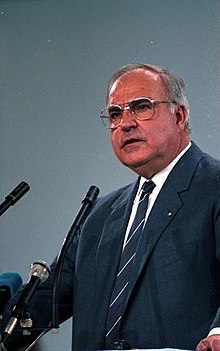
|
|
| Chancellor | Helmut Kohl |
| choice | 1987 |
| Legislative period | 11. |
| Appointed by | Federal President Richard von Weizsäcker |
| education | March 12, 1987 |
| The End | January 18, 1991 |
| Duration | 3 years and 312 days |
| predecessor | Cabinet Kohl II |
| successor | Cabinet Kohl IV |
| composition | |
| Party (s) | CDU / CSU, FDP |
| minister | 24 |
| representation | |
| German Bundestag | 282/519 |
| Opposition leader | Hans-Jochen Vogel ( SPD ) |
cabinet
| Office | photo | Surname | Political party |
Parliamentary State Secretary or Minister of State |
Political party | |
|---|---|---|---|---|---|---|
| Chancellor |
Helmut Kohl (1930-2017) |
CDU | - | - | ||
| Deputy Federal Chancellor |
Hans-Dietrich Genscher (1927-2016) |
FDP | ||||
| Foreign |
Irmgard Adam-Schwaetzer (* 1942) Helmut Schäfer (* 1933) |
FDP | ||||
| Interior |
Friedrich Zimmermann (1925–2012) until April 21, 1989 |
CSU |
Horst Waffenschmidt (1933–2002) Carl-Dieter Spranger (* 1939) |
CDU CSU |
||
|
Wolfgang Schäuble (* 1942) from April 21, 1989 |
CDU | |||||
| Judiciary |
Hans A. Engelhard (1934-2008) |
FDP |
Friedrich-Adolf Jahn (1935-2016) |
CDU | ||
| Finances |
Gerhard Stoltenberg (1928–2001) until April 21, 1989 |
CDU |
Hansjörg Häfele (* 1932) until April 21, 1989 Manfred Carstens (* 1943) Friedrich Voss (1931–2012) |
CDU CSU |
||
|
Theodor Waigel (* 1939) from April 21, 1989 |
CSU | |||||
| economy |
Martin Bangemann (* 1934) until December 9, 1988 |
FDP |
Ludolf-Georg von Wartenberg (* 1941) until July 4, 1989 Klaus Beckmann (1944–1994) Erich Riedl (1933–2018) |
CDU FDP CSU |
||
|
Helmut Haussmann (* 1943) from December 9, 1988 |
FDP | |||||
| Food, Agriculture and Forestry |
Ignaz Kiechle (1930-2003) |
CSU |
Georg Gallus (* 1927) Wolfgang von Geldern (* 1944) |
FDP CDU |
||
| Relations within Germany |
Dorothee Wilms (* 1929) |
CDU |
Ottfried Hennig (1937–1999) |
CDU | ||
| Work and social order |
Norbert Blüm (1935-2020) |
CDU |
Wolfgang Vogt (1929–2006) Stefan Höpfinger (1925–2004) until April 21, 1989 Horst Seehofer (* 1949) |
CDU CDU CSU |
||
| defense |
Manfred Wörner (1934–1994) until May 18, 1988 |
CDU |
Peter Kurt Würzbach (* 1937) until December 19, 1988 Willy Wimmer (* 1943) Agnes Hürland-Büning (1926–2009) |
CDU | ||
|
Rupert Scholz (* 1937) May 18, 1988 to April 21, 1989 |
CDU | |||||
|
Gerhard Stoltenberg from April 21, 1989 |
CDU | |||||
| Youth, family, women and health |
Rita Süssmuth (* 1937) until November 25, 1988 |
CDU |
Anton Pfeifer (* 1937) |
CDU | ||
|
Ursula Lehr (* 1930) from December 9, 1988 |
CDU | |||||
| traffic |
Jürgen Warnke (1932–2013) until April 21, 1989 |
CSU |
Dieter Schulte (* 1941) |
CDU | ||
|
Friedrich Zimmermann
(1925–2012) |
CSU | |||||
| Environment, nature conservation and reactor safety |
Walter Wallmann (1932–2013) until April 22, 1987 |
CDU |
Martin Grüner (1929–2018) Wolfgang Gröbl (* 1941) |
FDP CSU |
||
|
Klaus Töpfer (* 1938) from May 7, 1987 |
CDU | |||||
|
Post and telecommunications from July 1, 1989: Post and telecommunications
|
Christian Schwarz-Schilling (* 1930) |
CDU |
Wilhelm Rawe (1929-2017) |
CDU | ||
| Spatial planning, construction and urban planning |
Oscar Schneider (* 1927) until April 21, 1989 |
CSU |
Jürgen Echternach (1937-2006) |
CDU | ||
|
Gerda Hasselfeldt (* 1950) from April 21, 1989 |
CSU | |||||
| Research and technology |
Heinz Riesenhuber (* 1935) |
CDU |
Albert Probst (1931-2015) |
CSU | ||
| education and Science |
Jürgen W. Möllemann (1945–2003) |
FDP |
Irmgard Karwatzki (1940-2007) until April 21, 1989 Norbert Lammert (* 1948) |
CDU | ||
| Economic Cooperation |
Hans Klein (1931–1996) until April 21, 1989 |
CSU |
Volkmar Köhler (1930–2012) until April 21, 1989 Hans-Peter Repnik (* 1947) |
CDU | ||
|
Jürgen Warnke from April 21, 1989 |
CSU | |||||
|
Special tasks head of the Federal Chancellery |
Wolfgang Schäuble until April 21, 1989 |
CDU |
Lutz Stavenhagen (1940–1992) Lieselotte Berger (1920–1989) Representative of the Federal Government in Berlin until September 26, 1989 (deceased) Günter Straßmeir (1929–2009) Representative of the Federal Government in Berlin October 26, 1989 to December 20, 1990 |
CDU | ||
|
Rudolf Seiters (* 1937) from April 21, 1989 |
CDU | |||||
|
Special duties Head of the Federal Government's Press and Information Office |
Hans Klein April 21, 1989 to December 20, 1990 |
CSU | - | - | ||
| Special tasks |
Sabine Bergmann-Pohl (* 1946) from October 3, 1990 |
CDU | - | - | ||
| Special tasks |
Günther Krause (* 1953) from October 3, 1990 |
CDU | - | - | ||
| Special tasks |
Lothar de Maizière (* 1940) October 3 to December 19, 1990 |
CDU | - | - | ||
| Special tasks |
Rainer Ortleb (* 1944) from October 3, 1990 |
FDP | - | - | ||
| Special tasks |
Hansjoachim Walther (1939–2005) from October 3, 1990 |
DSU | - | - | ||
Changes
After the state elections in Hesse and the subsequent formation of a coalition of CDU and FDP, Federal Environment Minister Walter Wallmann resigned from the federal government on April 22, 1987; on April 24, 1987 he was elected Prime Minister of Hesse . The previous Minister for Environment and Health of the State of Rhineland-Palatinate, Klaus Töpfer , was appointed as the new Environment Minister on May 7, 1987 .
Defense Minister Manfred Wörner resigned on May 18, 1988 in order to take up his new post as NATO Secretary General on July 1, 1988 . His successor was the Senator for Justice and Federal Affairs of the State of Berlin , Rupert Scholz .
Federal Minister of Economics Martin Bangemann resigned on December 9, 1988 in order to be able to switch to the European Commission as Commissioner for Internal Market and Industry at the beginning of 1989 . His office as Minister of Economics was taken over by the former FDP General Secretary Helmut Haussmann .
Since she had been elected President of the German Bundestag on November 25, 1988 , Rita Süssmuth resigned on December 9, 1988. The new Federal Minister for Youth, Family, Women and Health was the Heidelberg Professor of Gerontology, Ursula Lehr .
On December 19, 1988, Parliamentary State Secretary Peter Kurt Würzbach resigned after a dispute with Federal Defense Minister Scholz about the low-level flight ban imposed by Würzbach after the plane crash in Remscheid . On the same day, Willy Wimmer was appointed as his successor as Parliamentary State Secretary at the Federal Minister of Defense .
An extensive cabinet reshuffle was carried out on April 21, 1989, which only affected the Union-led ministries. Federal Building Minister Oscar Schneider and Defense Minister Rupert Scholz , during whose short term of office the Ramstein and Remscheid accidents had occurred, were dismissed as Federal Ministers. The previous Minister of the Interior, Friedrich Zimmermann , became the new Federal Minister of Transport, the previous Minister of Finance, Gerhard Stoltenberg, the new Federal Minister of Defense and Transport Minister Jürgen Warnke, Federal Minister for Economic Cooperation. His predecessor in office, Hans Klein, took over as Federal Minister for Special Tasks as head of the Federal Government's Press and Information Office and the previous head of the Federal Chancellery, Wolfgang Schäuble , was appointed as the new Federal Minister of the Interior. For the first time, the previous chairman of the CSU regional group Theo Waigel and Gerda Hasselfeldt were appointed as Federal Minister for Regional Planning, Building and Urban Development. The previous First Parliamentary Managing Director of the CDU / CSU Bundestag faction , Rudolf Seiters , who was appointed as Federal Minister for special tasks to head the Federal Chancellery , also joined the cabinet .
Also on April 21, 1989, Parliamentary State Secretaries Hansjörg Häfele (Finance), Stefan Höpfinger (Labor and Social Affairs), Irmgard Karwatzki (Education and Science) and Volkmar Köhler (Economic Cooperation) left office. The previous chairman of the budget working group of the CDU / CSU parliamentary group Manfred Carstens , the previous social policy spokesman for the CSU regional group Horst Seehofer as parliamentary state secretary to the federal minister for labor and social affairs, and Norbert Lammert as parliamentary state secretary , were newly appointed as Parliamentary State Secretary at the Federal Minister of Finance at the Federal Minister of Education and Science and the previous chairman of the Baden-Württemberg regional group of the CDU / CSU parliamentary group Hans-Peter Repnik as Parliamentary State Secretary at the Federal Minister for Economic Cooperation.
After the number of CSU-led federal ministries had risen to six with the cabinet reshuffle, the FDP demanded another Parliamentary State Secretary to compensate. On July 4, 1989 Ludolf von Wartenberg left office. His successor at the Federal Minister of Economics was the previous parliamentary manager of the FDP parliamentary group, Klaus Beckmann .
After the death of the Parliamentary State Secretary to the Federal Chancellor and Plenipotentiary of the Federal Government in Berlin Lieselotte Berger on September 26, 1989, Günter Straßmeir was appointed her successor on October 26, 1989 .
With German reunification on October 3, 1990, the previous People's Chamber President Sabine Bergmann-Pohl , the last Prime Minister of the GDR Lothar de Maizière , the Parliamentary State Secretary to the Prime Minister of the GDR Günther Krause , the previous Chairman of the FDP Volkskammer faction Rainer Ortleb and the previous chairman of the DSU Volkskammer faction, Hansjoachim Walther, appointed federal minister for special tasks.
Lothar de Maizière resigned as Federal Minister on December 19, 1990 because of renewed allegations that he was an unofficial employee (IM) of the Ministry for State Security .
Individual evidence
- ↑ a b c d e f g h i j k l m n o Reshuffle of the Federal Cabinet - dismissals and appointments by the Federal President. In: Bulletin 36-89. Press and Information Office of the Federal Government, April 21, 1989, accessed on March 10, 2018 .
- ↑ a b c Appointment of Prof. Dr. Ursula Maria Lehr as Federal Minister for Youth, Family, Women and Health. In: Bulletin 173-88. Press and Information Office of the Federal Government, December 10, 1988, accessed on March 10, 2018 .
- ↑ a b Appointment of Professor Dr. Rupert Scholz as Federal Minister of Defense. In: Bulletin 66-88. Press and Information Office of the Federal Government, May 19, 1988, accessed on March 10, 2018 .
- ↑ Responsibility for democracy in the service of all citizens - election of the President of the German Bundestag. In: Bulletin 165-88. Press and Information Office of the Federal Government, November 29, 1988, accessed on March 10, 2018 .
- ↑ Oath of the Federal Minister for the Environment, Nature Conservation and Nuclear Safety. (PDF; 2.9 MB) In: Minutes of the plenary 11/10. German Bundestag, May 7, 1987, pp. 523-524 , accessed on March 10, 2018 .
- ↑ a b c d e Appointment and oath of federal ministers. In: Bulletin 118-90. Press and Information Office of the Federal Government, October 5, 1990, accessed on March 10, 2018 .
- ^ On the decision of Federal Minister de Maizière. In: Bulletin 147-90. Press and Information Office of the Federal Government, December 20, 1990, accessed on March 10, 2018 .






